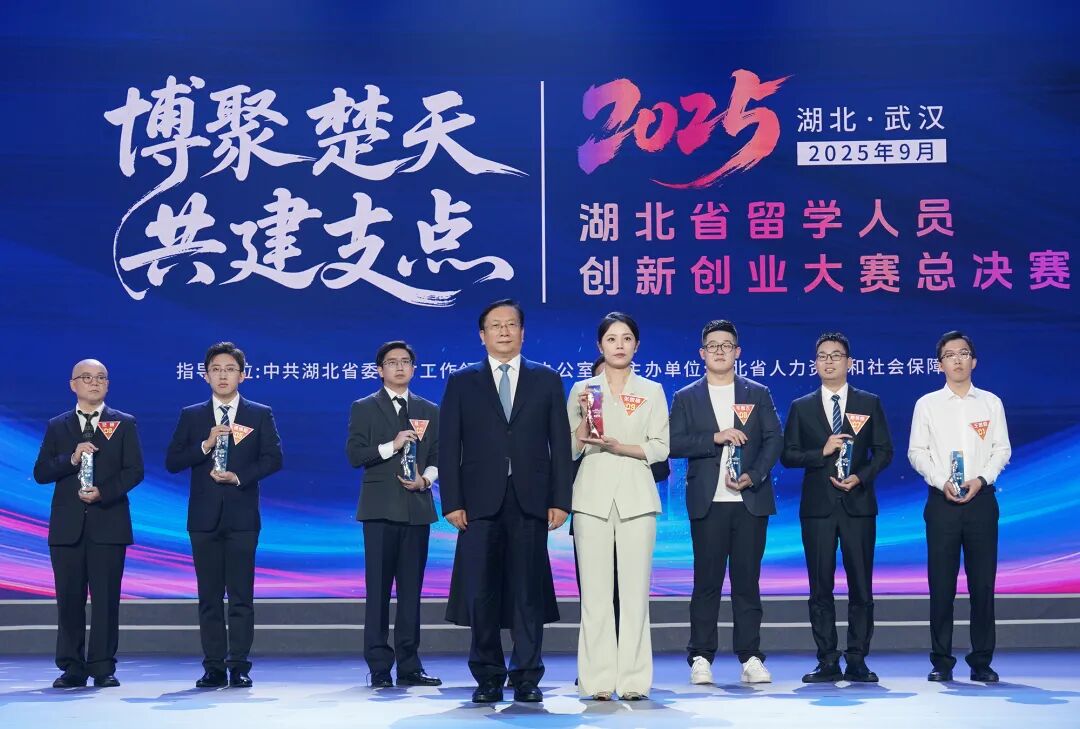On the afternoon of September 25th, the 2025 Hubei Province Overseas Returnees Innovation and Entrepreneurship Competition Finals were held in Wuhan under the theme «Gathering Talent in Chu, Building the Pivot Point». The Provincial Party Committee Secretary and Director of the Provincial People’s Congress Standing Committee attended the competition and presented awards to the grand prize winners.
In April of this year, Hubei Province launched an innovation and entrepreneurship competition primarily targeting overseas returnees and doctoral students/postdoctoral researchers abroad. The competition focused on the province’s key industries, setting up seven tracks: Robotics and High-End Equipment Manufacturing, New Generation Information Technology and Artificial Intelligence, New Energy and Energy Conservation/Environmental Protection, New Materials and Petrochemicals, Biomedicine and Health, Modern Agriculture and Food, and Other Industries. It attracted 551 doctoral students/postdoctoral researchers and 215 projects from 28 countries and regions.
The 9 projects participating in the finals were selected from numerous entries based on merit. Through project presentations and Q&A sessions with on-site scoring by judges, the «Road Solid Waste Recycling Agent R&D and Industrialization» project by a team of returnees from Norway won the grand prize. Two projects by teams from Hong Kong—»Compute-Storage Integration: Leading the New Generation of Computable Storage Chips» and «Key Technologies for Preparation and Integrated Design of Long-Life Refractory Linings for High-Temperature Industrial Insulation»—received gold awards. Six projects by returnee teams from Singapore, South Korea, the United States, and Canada—including «Novel CO₂ Capture and Conversion Application Technology,» «Photon CT: New Generation Low-Dose, High-Resolution Radiation Imaging Equipment,» and «World’s First Stroke Medication INPS1001″—were awarded silver prizes.
The Provincial Party Committee Secretary congratulated the winners and affirmed the competition’s success. He emphasized the importance of technological and product innovation, encouraging participants to achieve more landmark, original results in key core technology areas and transform scientific achievements into new productive forces. Hubei, as a major economic, scientific, educational, agricultural, and ecological province with a thriving economy exceeding 6 trillion yuan and 164 national-level innovation platforms, offers vast opportunities for talent. The province is deeply implementing a talent-strengthening strategy, cultivating an excellent innovation and entrepreneurship ecosystem, providing superior policy support and service environments to make Hubei a hub for talent to innovate, achieve, and realize dreams. He hopes overseas returnees will root themselves in Hubei, serve as its «ambassadors,» and share their positive experiences to attract more talent to the province.
Prior to the competition, the Provincial Party Committee Secretary visited an exhibition of innovations by overseas returnees and doctoral/postdoctoral researchers, learning about the competition’s organization and the province’s innovation efforts. He interacted with entrepreneurial teams, discussing technology R&D,成果转化, and market expansion, encouraging them to seize new opportunities, develop products, and enhance competitiveness to support Hubei’s development as a pivot point. He urged relevant departments to provide proactive guidance and support, using innovation and entrepreneurship to drive high-quality employment and attract talent to pursue dreams in Hubei.
Provincial leaders participated in the event and presented gold and silver awards. Academic experts and representatives from renowned enterprises, venture capital firms, and industrial parks served as judges, providing project feedback. Some venture capital institutions expressed investment intentions on-site. A talent recruitment signing ceremony was also held, with overseas talent representatives signing agreements with employers.




